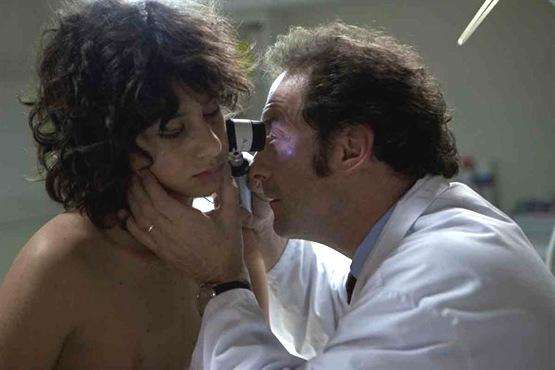 QUENTIN CHALLAL AND VINCENT LINDON IN MOONCHILDA patient and his doctor who must part Moonchild/La permission de minuit
QUENTIN CHALLAL AND VINCENT LINDON IN MOONCHILDA patient and his doctor who must part Moonchild/La permission de minuit is a medical tale that avoids the usual dangers of such tales even as it risks being stereotyped anyway. This is one of a number of stories (there was a film in 1988 in which Brad Pitt was the victim) about someone with the rare genetic disorder of xeroderma pigmentosum (XP). It occurs in only one in a quarter million in the US; more in Europe; six times that in Japan. In XP the body's ability to deal with the effects of ultraviolet rays is severely disabled. Fewer than 40% with the condition live beyond the age of 40; many get severe cancers before they're 20. Delphine Gleize's film handles this subject with delicacy and tact. Finally her subject is only partly the disease and more particularly the adolescent patient, his faithful longtime doctor, who goes through a big transition in his career, and the fraught relations between the doctor and the boy.
Here the patient with XP is is a 13-year-old called Romain (newcomer Quentin Chalal), who is "cool" (by his own declaration), energetic and tousel-haired. Romain likes girls and rugby and surfs in the moonlight, and, of course, since it's safe for him at night, he can go to parties. But he can't play night rugby with his pals because the playing field has UV lights. And he must be constantly checked, use a UV-reader to monitor the light safety even of indoor spaces, and wears a hood and mask and gloves when he goes out in the daytime.
Romain clearly wants to live life to the fullest he can. He wants pals, he wants parties, he wants a girlfriend, and he wants to make love, and he gets all that. but aside from his banishment from the light, he is otherwise isolated. His father split when he was diagnosed as a small child, and David (Vincent Lindon), his doctor, has taken on the role. They are very close. Perhaps Romain is the most important relationship in David's life. David is a bit of a workaholic, sometimes not very present for his wife (Caroline Proust).
With his stylishly wild mop of long hair and his springy athleticism Challal radiates a naturalness and spirit that save Romain from ever seeming the least pathetic, though he's allowed the occasional moment of fatalism about his condition. Lindon is as soulful and solid as usual. But David doesn't handle everything so well. He's been offered a significant post in his specialty with WHO in Belgium that he applied for twelve years ago, and he's leaving, but he doesn't know how to tell Romain about this. When the boy gets the news indirectly from his mother after an outing with David he becomes furious. He turns against David. The moment of cowardice is an excuse for lashing out at all he's angry about, both his condition and his sense of abandonment.
The new doctor replacing David is Carlotta (Emmanuelle Devos), whom Romain willingly switches to, partly to hurt David. The relationship between David and Carlotta itself is fraught. David isn't really ready to go, and he takes it out on Carlotta.
Lindon is always a pleasure to watch, and there is some similarity to his role in Philippe Lioret's
Welcome here: again he's a middle-aged man in crisis guiding a youth through worse. Devos too is always fascinating and complex, and her Carlotta shows class and grace in handling David's clumsy turning over of the reins. The last third of the film is dedicated to smoothing things out. Ultimately it's all about moving on.
La Permission de minuit was released March 2, 2011 in France and received generally good reviews for its taste and good acting (Allociné 3.4), but with some dissenters among the more hip who thought this a conventional bore, a TV movie;
Les Inrockuptibles and
Cahiers du Cinéma were particularly cruel. This is unfair: Delphine Gleize studiously avoids pathos and melodrama. But her studiousness may call too much attention to itself. An incurable medical condition is an elephant that will dominate any cinematic room.
Included in the UniFrance-Film Society of Lincoln Center joint March 1-11, 2012 Rendez-Vous with French Cinema series. The public screening is:
*Sat., March 3, 2012, 9:30pm BAMcinematek
*In person: Vincent Lindon




